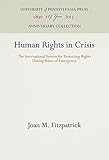Human Rights in Crisis : The International System for Protecting Rights During States of Emergency / Joan M. Fitzpatrick.
Material type: TextSeries: Procedural Aspects of International LawPublisher: Philadelphia : University of Pennsylvania Press, [1994]Copyright date: ©1994Description: 1 online resource (352 p.)Content type:
TextSeries: Procedural Aspects of International LawPublisher: Philadelphia : University of Pennsylvania Press, [1994]Copyright date: ©1994Description: 1 online resource (352 p.)Content type: - 9780812232387
- 9781512815924
- 341.4/81 20
- K3240.4 .F534 1994
- online - DeGruyter
- Issued also in print.
| Item type | Current library | Call number | URL | Status | Notes | Barcode | |
|---|---|---|---|---|---|---|---|
 eBook
eBook
|
Biblioteca "Angelicum" Pont. Univ. S.Tommaso d'Aquino Nuvola online | online - DeGruyter (Browse shelf(Opens below)) | Online access | Not for loan (Accesso limitato) | Accesso per gli utenti autorizzati / Access for authorized users | (dgr)9781512815924 |
Browsing Biblioteca "Angelicum" Pont. Univ. S.Tommaso d'Aquino shelves, Shelving location: Nuvola online Close shelf browser (Hides shelf browser)

|

|

|

|

|

|

|
||
| online - DeGruyter Folkways in Thomas Hardy / | online - DeGruyter American Studies in Transition / | online - DeGruyter Leisure Spending-Behavior / | online - DeGruyter Human Rights in Crisis : The International System for Protecting Rights During States of Emergency / | online - DeGruyter Market Restraints in the Retail Drug Industry / | online - DeGruyter The Quaker Star Under Seven Flags, 1917-1927 / | online - DeGruyter Edward Hicks, Painter of the Peaceable Kingdom / |
Frontmatter -- Contents -- Editor's Foreword -- Acknowledgments -- I. Defining the Problem -- II. Effects of Emergencies on Human Rights -- III. Setting Standards -- IV. The United Nations System: Treaty Organs -- V. The United Nations System: Non-Treaty Mechanisms -- VI. Regional Systems -- VII. The Role of Non-Governmental Organizations -- VIII. Conclusion -- Appendix: The Queensland Guidelines for Bodies Monitoring Respect for Human Rights During States of Emergency -- Bibliography -- Table of Cases -- Index -- Backmatter
restricted access online access with authorization star
http://purl.org/coar/access_right/c_16ec
Recent events in South America, central Europe, Africa, and Russia have again brought to the world's attention the complex interrelationship between states of emergency and the preservation of fundamental human rights. In Human Rights in Crisis, Joan Fitzpatrick offers the first systematic and comprehensive effort to examine the multifaceted system for monitoring human rights abuses under "states of exception." Unlike previous studies, this book does not focus on substantive norms governing crises, but rather on how those norms might best be implemented. Building upon her six-year study for the International Law Association, the author confronts the difficulties in defining a coherent concept of emergency, particularly the various forms of de facto emergencies that have been relatively neglected by international monitors. She also profiles and carefully critiques the numerous international bodies that have monitored human rights abuses during states of exception. These bodies include not only the treaty organs of the United Nations, the Council of Europe, and the Organization of American States but also the political organs of the United Nations (especially the Commission on Human Rights), the International Labor Organization, and the emerging structures of the Conference on Security and Cooperation in Europe.
Issued also in print.
Mode of access: Internet via World Wide Web.
In English.
Description based on online resource; title from PDF title page (publisher's Web site, viewed 30. Aug 2021)


